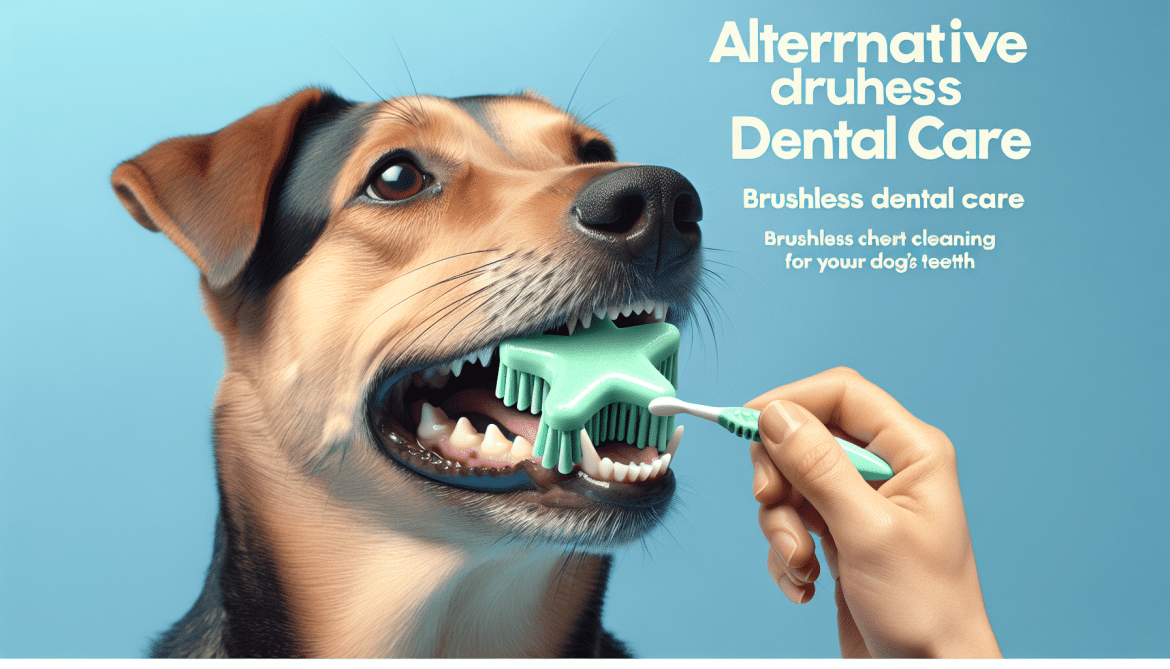Maintaining good dental hygiene for your furry companion is essential for their overall health and well-being. However, the traditional method of brushing your dog's teeth might not always be the easiest or most preferred option. Enter alternative dental care: brushless cleaning. In this article, we will explore the benefits and options available for keeping your dog's teeth clean and healthy without the need for a toothbrush. Say goodbye to the struggle and say hello to a happier, healthier smile for your four-legged friend.
Why Dental Care is Important for Dogs
Taking care of your dog's dental health is essential for their overall well-being. Just like humans, dogs can develop dental disease, which can lead to a range of health issues if left untreated. By prioritizing dental care for your furry friend, you can prevent dental disease, improve their overall health, prevent bad breath, and enhance their quality of life.
Prevention of Dental Disease
Regular dental care can significantly reduce the risk of dental disease in dogs. Dental disease, such as gum inflammation, tooth decay, and periodontal disease, can cause pain and discomfort for your dog. It can also result in tooth loss and infection, which can spread to other parts of the body and affect overall health. By implementing a dental care routine, you can help prevent these issues and ensure your dog's teeth and gums remain healthy.
Improvement of Overall Health
Good dental health influences your dog's overall health and well-being. The bacteria present in dental plaque can enter the bloodstream and affect vital organs, such as the heart, liver, and kidneys. This can lead to serious health conditions, including heart disease and kidney infections. By prioritizing dental care, you can reduce the risk of these systemic infections and help your dog maintain optimal health.
Prevention of Bad Breath
Nobody enjoys being greeted by their furry friend's unpleasant breath. Bad breath in dogs is often a sign of poor dental hygiene or underlying dental issues. Regular dental care can help combat bad breath by eliminating bacteria and plaque buildup in your dog's mouth. By addressing the root cause, you can help your dog maintain fresh breath and improve their overall oral health.
Enhancement of Quality of Life
Imagine how uncomfortable it would be to have dental pain or the constant irritation of gum disease. Dogs also experience discomfort in such situations, which can impact their quality of life. By providing proper dental care, you can help your dog avoid dental pain, infections, and other oral health issues. This will contribute to their overall happiness and ensure they lead a vibrant and pain-free life.
Traditional Brushing vs. Alternative Dental Care
When it comes to maintaining your dog's dental hygiene, traditional brushing is the most commonly recommended method. However, it's essential to explore alternative dental care options to find the best fit for you and your furry companion.
Challenges of Traditional Brushing
Traditional brushing can pose challenges, especially if your dog is resistant or fearful of the process. Some dogs may become anxious, making it difficult to brush their teeth effectively. Additionally, brushing requires a certain level of manual dexterity and technique to clean all areas of your dog's mouth thoroughly. This can be challenging for pet owners, especially those who are inexperienced or have dogs who are not cooperative during brushing sessions.
Benefits of Alternative Dental Care
Alternative dental care offers a range of benefits that can complement or replace traditional brushing. These options provide effective oral hygiene for dogs without the need for brushing, making it suitable for dogs who dislike the process. Alternative dental care products help control plaque and tartar, freshen breath, and promote healthy gums. By exploring these alternatives, you can find a method that works best for your dog and ensures their dental health.
Combining Methods for Optimal Results
While alternative dental care methods can be effective on their own, combining them with traditional brushing can provide optimal results. By using a combination of dental chews, oral gels, water additives, and toys, along with regular brushing, you can ensure comprehensive dental care for your dog. This approach allows you to address different aspects of dental health and keep your dog's teeth and gums in excellent condition.

This image is property of images.pexels.com.
Alternative Dental Care Options
If traditional brushing is not suitable for your dog, there are several alternative dental care options available. These products and methods provide effective dental hygiene without the need for brushing.
Dental Chews and Treats
Dental chews and treats are designed to promote dental health while providing a tasty reward for your furry friend. These products are often made with texture and ingredients that help remove plaque and tartar buildup. Some dental chews are also formulated with enzymes and probiotics to support oral health. Make sure to choose chews and treats that have the Veterinary Oral Health Council (VOHC) seal of approval for maximum effectiveness.
Oral Gels and Sprays
Oral gels and sprays offer a convenient and brushless way to maintain your dog's dental health. These products typically contain enzymes and antibacterial agents that help break down plaque, control tartar, and freshen breath. Simply apply the gel or spray as directed, allowing it to come into contact with your dog's teeth and gums. This method can help reduce the need for brushing while still providing effective dental care.
Water Additives
Water additives are an effortless way to improve your dog's dental health. These products are added to your dog's drinking water and work by reducing plaque and tartar formation. Water additive formulas often contain antibacterial agents that help control the growth of bacteria in the mouth. By simply providing your dog with treated water, you can contribute to their dental hygiene without the need for brushing or any additional effort.
Dental Wipes
Dental wipes offer a convenient option for cleaning your dog's teeth and gums. These wipes are specifically designed to remove plaque and debris from the teeth, as well as freshen breath. They are easy to use and allow pet owners to reach areas that may be difficult to access with a toothbrush. Dental wipes are an excellent alternative for dogs who are resistant to traditional brushing or for those who require more targeted cleaning in specific areas of the mouth.
Dental Toys
Dental toys serve a dual purpose - they provide entertainment and promote dental health. These toys are made with textures and shapes that help clean your dog's teeth and gums as they chew. They can effectively remove plaque, stimulate the gums, and prevent tartar buildup. Dental toys are a fun and practical alternative for dogs who enjoy chewing, offering dental care benefits during playtime.
Natural Raw Bones
Raw bones can be a valuable addition to your dog's dental care routine. These uncooked bones, such as raw meaty bones or raw knucklebones, can help clean your dog's teeth naturally as they chew. The chewing action scrapes off plaque and tartar, promoting healthy teeth and gums. However, it's vital to choose the appropriate size and type of bone for your dog and ensure proper supervision during chewing to prevent any choking hazards.
Special Diets
Some special dental diets are specifically formulated to promote oral health in dogs. These diets often feature unique kibble shapes and sizes that help remove plaque and tartar as your dog chews. They may also contain ingredients that support gum health and freshen breath. Special dental diets can be a beneficial option for dogs with specific dental needs or those who require a change in their regular diet.
Choosing the Right Alternative Dental Care Products
When selecting alternative dental care products for your dog, it's essential to consider their specific needs and seek guidance from your veterinarian. Here are some factors to consider when choosing the right products:
Consider Your Dog's Specific Needs
Different dogs have different dental health requirements. Some may have more significant plaque buildup, sensitive gums, or be prone to certain dental issues. Consider your dog's age, breed, dental history, and any specific concerns they may have. This will help you choose the most suitable alternative dental care products tailored to their individual needs.
Consult with Your Veterinarian
Your veterinarian is a valuable resource when it comes to choosing the right dental care products for your dog. They can assess your dog's dental health, provide recommendations, and guide you towards the most effective options. Your veterinarian can also help determine if your dog requires additional dental treatments, such as professional cleaning or extractions, and recommend products that support those treatments.
Check for Safety and Quality
Before purchasing any alternative dental care products, check for safety and quality certifications. Look for product labels that indicate compliance with safety standards and quality control. Avoid products that contain potentially harmful ingredients or have a history of safety issues. It's crucial to prioritize your dog's health and choose products from reputable brands that prioritize quality and safety.
Read Product Reviews
Researching and reading reviews from other pet owners can provide valuable insights into the effectiveness and suitability of alternative dental care products. Look for reviews that discuss the product's impact on dental health, ease of use, and overall satisfaction. While individual experiences may vary, reviews can help you make an informed decision and narrow down your options.
Trial and Error
Finding the right alternative dental care products may involve some trial and error. Every dog is unique, and what works for one may not work for another. Be patient and open to trying different products to find the ones that work best for your dog. It's essential to evaluate the effectiveness, ease of use, and your dog's response to the products to ensure they are receiving the best dental care possible.

This image is property of images.pexels.com.
Training Your Dog for Brushless Dental Care
Introducing your dog to brushless dental care can be a smooth and enjoyable experience with these training tips:
Introduce Dental Care Gradually
Gradual introduction is crucial when starting any new dental care routine for your dog. Begin by slowly introducing the new products or methods, allowing your dog to familiarize themselves with the taste, texture, or sensation. Start with short sessions and gradually increase the duration over time. This approach will help your dog feel comfortable and prevent them from becoming overwhelmed or resistant to dental care.
Use Positive Reinforcement
Positive reinforcement plays a significant role in training dogs for dental care. Praise, treats, and rewards can create a positive association with the dental care experience. Offer rewards and verbal encouragement during and after each dental care session, acknowledging your dog's cooperation and good behavior. This positive reinforcement will motivate your dog and make them more receptive to future dental care sessions.
Make It a Fun Experience
Dental care doesn't have to be dull or stressful. Make it a fun experience for your dog by incorporating playfulness, toys, or treats. For example, you can engage your dog with dental toys during brushing or use dental treats as a reward afterward. With a creative and lighthearted approach, you can turn dental care into an enjoyable bonding activity for you and your furry friend.
Regularly Practice Dental Care
Consistency is key when training your dog for brushless dental care. Set aside designated times each day or week for dental care sessions. Regular practice will help establish a routine and reinforce good dental hygiene habits for your dog. By making dental care a regular part of their daily life, your dog will become more comfortable and cooperative during these sessions.
Seek Professional Help if Needed
If your dog continues to resist dental care or exhibits excessive fear or anxiety, it may be beneficial to seek assistance from a professional dog trainer or behaviorist. These experts can provide guidance on training techniques specific to your dog's needs, helping you overcome any challenges and ensure a positive dental care experience.
Creating a Dental Care Routine
Establishing a dental care routine is essential to maintain your dog's oral health. Follow these steps to create an effective routine for your furry friend:
Establish a Regular Schedule
Consistency is key in maintaining good dental hygiene for your dog. Establish a regular schedule for dental care sessions and stick to it. Whether you choose to brush your dog's teeth daily or use alternative dental care methods a few times a week, a consistent schedule ensures that dental care remains a priority and is not overlooked.
Combine Different Dental Care Methods
To achieve optimal results, combine different dental care methods. Use a combination of dental chews, gels, sprays, toys, wipes, and any other products that work well for your dog. Combining methods allows you to target different aspects of dental health, ensuring a comprehensive approach to your dog's dental care.
Monitor Your Dog's Oral Health
Regularly monitor your dog's oral health to detect any changes or issues that may require attention. Keep an eye out for signs of dental disease, such as red or swollen gums, excessive drooling, persistent bad breath, or tartar buildup. By regularly inspecting your dog's mouth, you can identify potential problems and address them promptly.
Regular Veterinary Check-ups
In addition to a dental care routine at home, it's crucial to schedule regular veterinary check-ups for your dog's oral health. Your veterinarian can perform thorough dental examinations, clean your dog's teeth professionally if necessary, and address any dental health concerns. Regular check-ups ensure that your dog's dental health is monitored by a professional and any necessary interventions can be made in a timely manner.

This image is property of images.pexels.com.
Common Misconceptions About Brushless Dental Care
Brushless dental care is often misunderstood, leading to some common misconceptions. Let's debunk these misconceptions and provide clarity:
Alternative Dental Care is Ineffective
Contrary to belief, alternative dental care methods can be highly effective in maintaining your dog's oral health. These methods have been designed and developed to address various dental hygiene needs, offering solutions beyond traditional brushing. When used correctly and in combination with other dental care methods, brushless dental care can have a significant and positive impact on your dog's oral health.
Brushing is the Only Effective Method
While brushing is an effective dental care method, it is not the only option for maintaining your dog's oral health. Alternative dental care methods, such as dental chews, gels, sprays, and toys, can provide excellent results. These options offer convenience, are suitable for dogs who dislike brushing, and can be used as supplemental methods alongside regular brushing. It's important to choose the method that works best for your dog and their specific needs.
Alternative Dental Care is Expensive
Alternative dental care products may come with a cost, but they are often more cost-effective in the long run compared to potential dental treatments resulting from neglected oral health. Regular dental cleanings and treatments can be expensive and may require anesthesia, which comes with its own set of risks. By investing in alternative dental care, you can prevent these costly treatments and maintain your dog's oral health in a more affordable and proactive manner.
Brushless Dental Care Takes Longer
Brushless dental care methods are designed to be convenient and time-efficient. While they may require some time for application or supervision, they often save time compared to traditional brushing, which can be a lengthier process. Dental chews, sprays, and other alternative methods can be incorporated into your dog's routine with minimal disruption, allowing you to provide effective dental care without adding significant time commitments to your day.
Tips for Maintaining Good Oral Hygiene
In addition to implementing a dental care routine, consider these tips to further support your dog's oral hygiene:
Avoid Table Scraps and Human Food
Limit the consumption of table scraps and human food, as they can contribute to dental issues in dogs. Human food can contain ingredients that are harmful to dogs' teeth, and the habit of feeding from the table can reinforce begging behavior. Stick to a balanced and nutritious diet formulated for dogs to ensure optimal oral health.
Provide Appropriate Chew Toys
Offering appropriate chew toys can help satisfy your dog's natural chewing instincts while promoting oral health. Choose toys that are specifically designed to clean teeth and massage gums, such as dental toys or sturdy rubber toys. Avoid toys that are too hard or small, as they can present choking hazards or damage your dog's teeth.
Regularly Clean Water and Food Bowls
Clean your dog's water and food bowls regularly to prevent the buildup of bacteria and plaque. Bacteria can thrive in dirty bowls and contribute to oral health issues. Wash the bowls with warm, soapy water after each meal and provide fresh water multiple times a day.
Monitor Teeth and Gum Health
Regularly inspect your dog's teeth and gums for any signs of abnormalities or changes. Check for redness, swelling, bleeding, excessive tartar buildup, or loose teeth. By monitoring your dog's oral health, you can detect issues early on and seek veterinary assistance if necessary.
Regularly Inspect Your Dog's Mouth
Beyond teeth and gums, it's important to inspect your dog's entire mouth. Look for any unusual growths, discoloration, or sores on the tongue, lips, or roof of the mouth. These signs may indicate underlying health concerns that require veterinary attention.
When to Seek Professional Dental Care
While at-home dental care is essential, certain signs indicate the need for professional dental care. If you notice any of the following, it's time to consult your veterinarian:
Persistent Bad Breath
If your dog exhibits persistent and foul-smelling breath, it may indicate an underlying dental issue that requires professional attention. Bad breath is often a sign of infection or dental disease, and timely intervention is crucial to avoid further complications.
Excessive Drooling
Excessive drooling can be a sign of dental pain or discomfort. If your dog's drooling becomes excessive, accompanied by reluctance to eat or play, it's important to have their oral health evaluated by a veterinarian.
Bleeding or Swollen Gums
Any signs of bleeding, swelling, or inflammation in your dog's gums should not be ignored. These symptoms are often indicators of gum disease or other dental conditions. Prompt veterinary evaluation can help alleviate pain and prevent the progression of these issues.
Tooth Loss or Fracture
Tooth loss or fractures require immediate professional attention. These issues can cause significant pain and pose further risks to your dog's oral health. Your veterinarian can assess the extent of the damage and provide appropriate treatment options.
Unusual Discoloration or Growths
Any unusual discoloration, growths, or lumps discovered in your dog's mouth require veterinary examination. These signs may indicate oral tumors, cysts, or other abnormalities that warrant investigation and potential treatment.
Conclusion
Prioritizing your dog's dental health is crucial for their overall well-being. By exploring alternative dental care options, you can provide effective oral hygiene for your furry friend without the challenges of traditional brushing. Combining different methods, such as dental chews, gels, sprays, toys, and wipes, can ensure comprehensive dental care for your dog. Remember to consider your dog's specific needs, consult with your veterinarian, and choose products that prioritize safety and quality. Training your dog for brushless dental care can be enjoyable and rewarding, with the use of positive reinforcement and gradual introduction. Stick to a dental care routine, monitor your dog's oral health, and seek professional dental care when necessary. By following these guidelines, you can enjoy a healthy smile together with your beloved canine companion.


